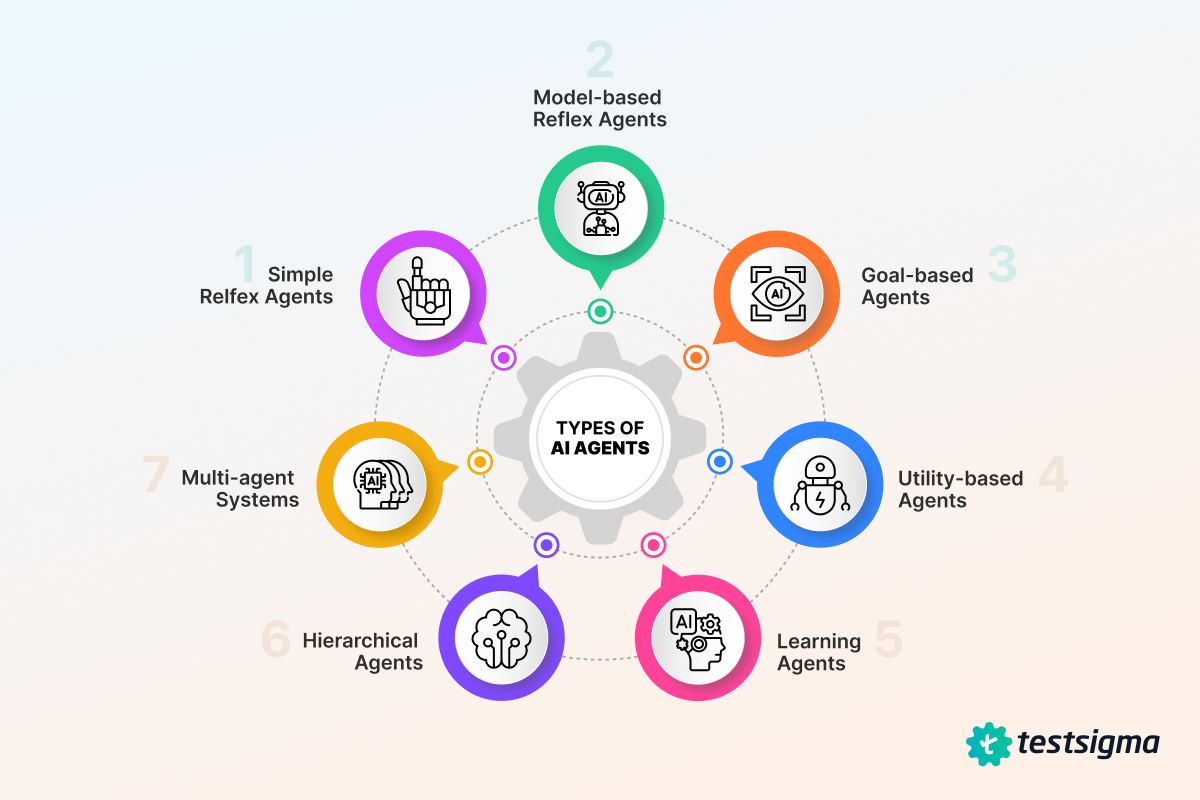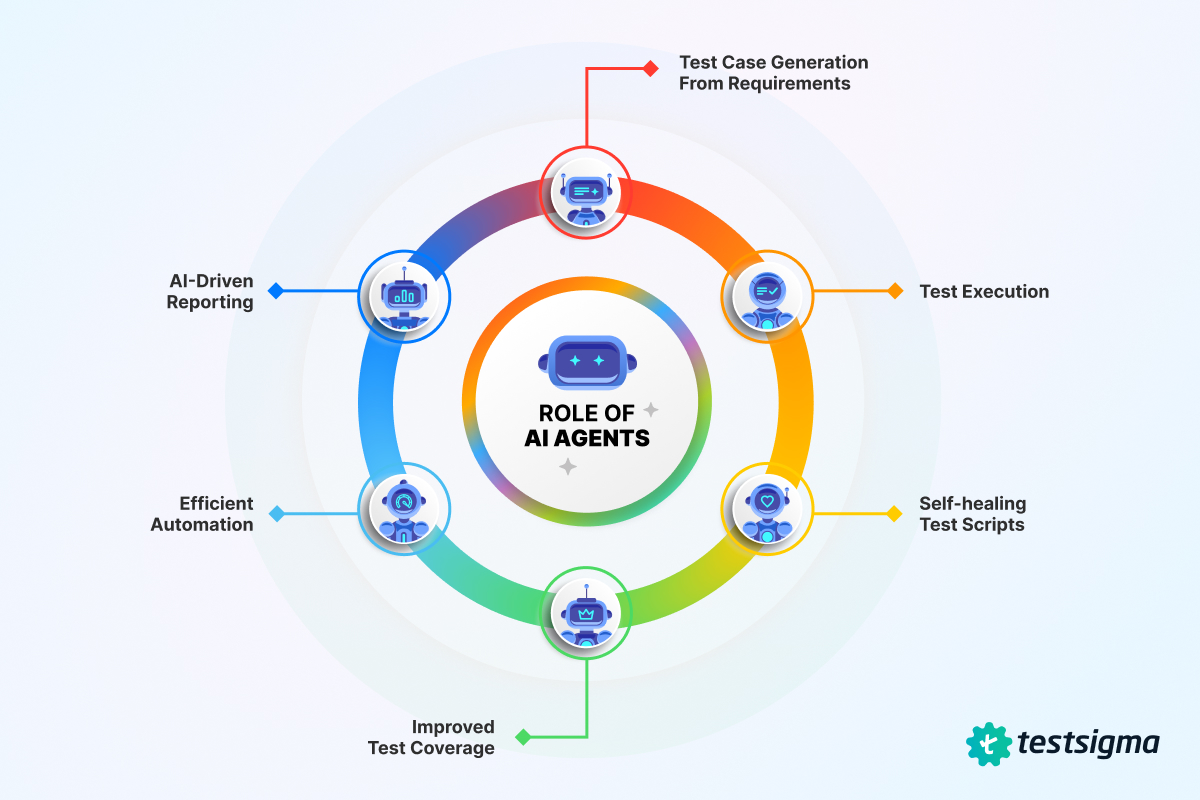Prompt Templates for Pro-level test cases
Get prompt templates that give agents context + constraints, so they output detailed test cases with steps, results, and edge cases.
AI is already assisting testers in solving real challenges in software testing. However, according to Gartner, this is about to advance further with Agentic AI.
Gartner’s October 2024 report predicted that by 2028, 33% of enterprise applications will include agentic AI, and 15% of repetitive workflows will be carried out autonomously. Therefore, people in the QA space need to understand AI testing agents. This blog details everything about AI agents in software testing.
Table Of Contents
- 1 What is an AI Testing Agent?
- 2 Different Types of AI Agents In Software Testing
- 3 Different Features of AI Testing Agents
- 4 Role of AI Agents in Software Testing
- 5 Enhance Your QA Process With Testsigma’s AI Testing Agents
- 6 Benefits of Using AI Testing Agents in Software Testing
- 7 Challenges of Using AI Testing Agents in Software Testing
- 8 The Future of AI Testing Agents
- 9 Conclusion
What is an AI Testing Agent?
An AI agent is a software system that uses AI to perform tasks and achieve goals autonomously, with minimal human intervention. Likewise, an AI testing agent is an intelligent system trained to automate testing activities, execute tests, analyze results, and optimize tests automatically, with minimal manual intervention.
In short, AI agents for software testing act like intelligent assistants to testers, performing repetitive and mundane tasks, allowing testers to focus on decision-making and larger QA goals.
How Does an AI Testing Agent Actually Work?
AI testing agents work like smart assistants for your QA team. They first learn patterns from historical test data and application behavior using machine learning. This helps them understand the application’s structure, user flows, and recent changes, whether from design files, user stories, or code commits.
Based on this context, they decide what to test, how to test it, and when. They then use Natural Language Processing (NLP) to interpret plain English inputs like test steps, requirements, or bug reports. This allows them to convert human-readable content into executable test cases. Once tests are running, AI agents analyze results, detect bugs, highlight patterns (like flaky tests), and even update test scripts automatically when the UI changes, ensuring your tests stay up-to-date with minimal effort.
These agents are powered by core AI systems. They include a perception module to understand the app’s current state, a memory that tracks what has happened before, a planning engine to decide what to test next, and an execution system that runs the tests and fixes broken ones automatically.
Different Types of AI Agents in Software Testing
The following are the different types of AI testing agents:

1. Simple Reflex Agents
This is the most basic type of agent. Decisions are made only using the current input, and past experiences are not considered for better coverage.
2. Model-Based Reflex Agents
These agents make more informed decisions. They maintain an internal model of the system they are testing, which allows them to consider past test details and predict future statistics.
3. Goal-Based Agents
These agents have specific goals to achieve during testing. Actions are evaluated based on how well they contribute to reaching these goals.
4. Utility-Based Agents
These agents are used to prioritize tests. They consider the impact of the outcomes when making decisions and choose actions that optimize their benefit.
5. Learning Agents
These agents improve their performance by learning from the past experiences of the system they are testing.
6. Hierarchical Agents
These agents are used in complex testing scenarios. They break these scenarios down into smaller, more manageable tasks.
7. Multi-Agent Systems
These agents are also used for complex testing scenarios. Multiple AI agents interact with each other and work together to achieve a common testing goal.
Different Features of AI Testing Agents
Some of the powerful capabilities AI testing agents bring that help teams move faster and smarter in the QA process are:
1. Natural Language Processing (NLP)
Test cases can be written in plain English, making test automation accessible even to those without programming skills.
2. AI-Powered Insights
Real-time analysis finds flaky tests, failure patterns, and root causes, helping teams quickly identify and resolve issues.
3. Adaptability and Self-Learning
By learning from test history and app behavior, agents automatically update scripts as applications evolve, reducing manual maintenance.
4. Broader Test Coverage
Untested user flows and edge cases are flagged based on usage data and application structure, ensuring stronger overall coverage.
5. Autonomous Bug Detection
Bugs are identified, classified by severity, and packaged with logs and screenshots, making it easier for teams to act quickly.
Role of AI Agents in Software Testing
Some of the real world applications of AI testing agents are as follows:

1. Test Case Generation From Requirements
AI testing agents analyze user flows, historical data on defects, and code changes, and generate relevant test cases.
2. Test Execution
These agents prioritize tests based on risk, code changes, and impact, and automatically run them, ensuring that high-priority areas are always tested first.
3. Self-Healing Test Scripts
AI agents automatically detect UI or other changes in the application and update test scripts accordingly. This prevents tests from breaking and minimizes test maintenance.
4. Improved Test Coverage
AI agents identify areas that are not tested and generate edge cases that might otherwise be overlooked.
5. Efficient Automation
AI agents for testing automate repetitive tasks, identify patterns in testing, adapt and learn from previous test results, and improve their performance. This kind of efficiency speeds up the overall testing process.
6. AI-Driven Reporting
The real-time reports that the AI test agent provide include insights like failure patterns, root causes, and quality trends. This helps teams take action faster.
Enhance Your QA Process with Testsigma’s AI Testing Agents

With faster release cycles, the QA team faces much pressure to deliver faster quality checks without missing bugs. Even with traditional automation, it is tough to keep up with test breaks, minimal coverage, and time-consuming reporting. But generative AI in software testing has changed the game.
Testsigma is a codeless, cloud-based, Agentic AI-driven test automation platform. Its various AI agents for test automation assist testers throughout the testing process to reduce repetitive work and optimize productivity.
Also Read: AI in Quality Assurance
Meet Testsigma’s AI Agents
Atto, the AI coworker, consists of a crew of AI testing agents, which will be discussed below:
| Agent Name | What It Does |
| Generator Agent | It generates test cases automatically from natural language without writing code. It can get input via prompts, Figma designs, JIRA requirements, videos, docs, images, and more. |
| Data Generator Agent | It automatically generates test data to support a wide range of test scenarios. |
| Coverage Planner Agent | Finds missing areas in your test coverage and suggests improvements. |
| Optimizer Agent | Analyzes real-time data and updates existing test cases based on changes in user behavior, code, APIs, and deployment status. |
| Analyzer Agent | Detects flaky tests, identifies false failures, performs root cause analysis, and auto-resolves test issues to reduce manual debugging. |
| Maintenance Agent | Updates your test scripts automatically when the app changes. |
| Bug Reporter | Collects logs, screenshots, and steps when a test fails, ready to share with devs. |
Why Testsigma Powers up Your Test Automation by 10x?
Testsigma is one of the best AI testing tools that offers unified automation for web, mobile, API, desktop, Salesforce, and SAP testing without coding or setup required. It is a no-code platform and has built-in AI test agents for autonomous testing.
1. Language‑agnostic Test Creation
You don’t need to learn or use a specific programming language. The Generator agent allows your team to create test cases using plain English, prompts, Figma designs, JIRA tickets, and more.
2. Reduced Maintenance Effort
Testers don’t have to manually fix broken scripts. The Maintenance agent uses self-healing capabilities to automatically update tests when your application changes.
3. Works with Your Existing Tools
You can continue using your current CI/CD systems, bug trackers, and collaboration tools. Testsigma integrates with over 30+ popular platforms to fit into your workflow easily.
4. Quick Setup and Easy to Scale
Testsigma offers a cloud-based test automation platform that is quick to set up, easy to use, and backed by a responsive support team.
5. Support for a Wide Range of Testing Types
You can use Testsigma for multiple testing needs, including regression testing, continuous testing, end-to-end testing, sanity testing, functional testing, user acceptance testing, integration testing, and system testing.
Benefits of Using AI Testing Agents in Software Testing
1. Faster Test Cycles
When AI agents are used for software testing or test automation, they generate, execute, and analyze tests faster with fewer errors, significantly reducing release time.
2. Reduced Test Maintenance
AI testing agents use self-healing capabilities to detect UI changes and prevent test scripts from breaking, reducing manual maintenance.
3. Wider Test Coverage
Software testing agents can explore multiple user paths, edge cases, and combinations that are difficult to cover manually.
4. Smarter Test Case Prioritization
AI agents can analyze and identify high-risk areas, focus testing on the most critical paths, and catch critical bugs earlier.
Challenges of Using AI Testing Agents in Software Testing
Many studies have found that using Agentic AI in software test automation reduces the overall cost of testing in terms of time and resources. However, AI agents in test automation are an evolving tech, and there are a few limitations:
1. Model Training & DATA Dependency
AI test agents rely on training data extensively, and poor-quality input can lead to errors in the testing process. The results depend on clean, diverse, and relevant test data-based training.
2. Initial Setup & Integration Overhead
Adopting agentic AI requires integrating with your existing test frameworks and CI/CD tools. Many legacy tools have limited integration capabilities.
The Future of AI Testing Agents
AI test agents are evolving rapidly, and in the near future, we can expect to see them working more closely with testers in more specialized roles such as:
1. Collaborative AI Testing Agents
AI agents in the future will work together or alongside testers to share findings and improve test strategies. Each agent could specialize in areas like UI, performance, or security, and adjust its approach based on insights from others.
2. AI-Assisted Exploratory Testing
Using AI resources, teams can guide exploratory testing by identifying high-risk, complex, or under-tested areas, allowing testers to focus their efforts more effectively.
3. Personalized, User-Centric Testing
AI testing agents might use user behavior and performance data to design more relevant test cases. This ensures testing focuses on real-world usage and improves product quality.
Conclusion
AI testing agents are intelligent tools that optimize the entire QA process, making tests more autonomous to fit modern development cycles. As testing shifts towards speed and continuous delivery, AI agents enable teams to keep up without compromising quality. With growing support for collaborative and user-centric testing, AI agents are becoming essential, not optional, for modern software testing.
Frequently Asked Questions
• Test case generation
• Self healing
• Automated bug reporting
• Adapting to code changes, etc.



